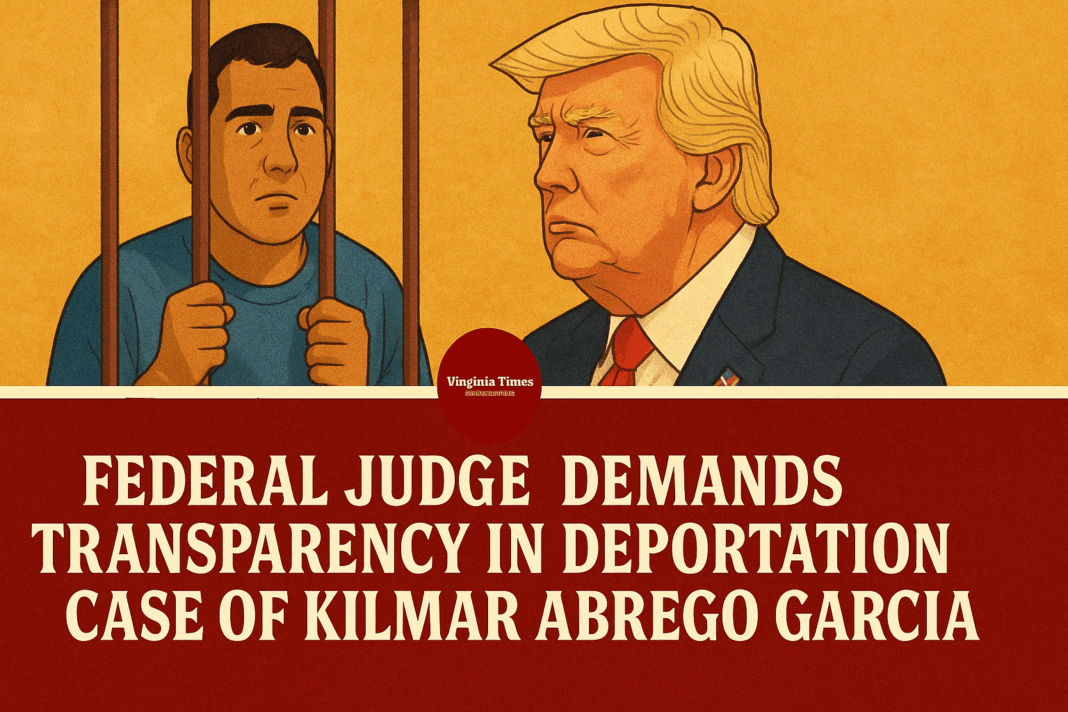Greenbelt, MD — A federal judge is demanding transparency from the Trump administration following the controversial deportation of Kilmar Armando Abrego Garcia, a Maryland resident erroneously expelled to El Salvador last month despite ongoing legal protections.
At a hearing Monday evening in Greenbelt, U.S. District Judge Paula Xinis ordered a sweeping two-week discovery process, compelling the Departments of Justice (DOJ) and Homeland Security (DHS) to produce detailed records related to Abrego Garcia’s detention, deportation, and efforts to facilitate his return. Her directive follows mounting frustration over conflicting government statements and what she described as an unacceptable lack of progress.
“Complete accountability is what this court demands,” Judge Xinis said, according to court observers, adding that there will be “no room for gamesmanship or grandstanding.” The order expands on a previous mandate requiring daily status updates—reports that advocacy groups have criticized as vague and inadequate.
Abrego Garcia, a father of three and long-time Maryland resident, was deported from the United States on March 15, 2025. His legal team, led by Simon Sandoval-Moshenberg of the Legal Aid Justice Center, contends the removal violated a judicial stay and ignored recent higher court decisions intended to protect due process.
Tensions escalated after DHS suggested in a recent court filing that Abrego Garcia could still face re-deportation even if allowed to re-enter through a U.S. port of entry. His attorneys expressed outrage, accusing the administration of sidestepping court orders and casting doubt on its commitment to resolving the matter.
Further complicating the case, DOJ officials have cited alleged gang affiliations to justify inaction—claims his legal counsel categorically rejects. “There is no criminal history here,” Sandoval-Moshenberg said. “This is a father, not a terrorist.”
Meanwhile, Salvadoran authorities, including President Nayib Bukele, have reportedly refused to release Abrego Garcia, who is believed to be held in the country’s notorious Centro de Confinamiento del Terrorismo (CECOT), a maximum-security prison designed for suspected gang members. While Bukele has not directly named Abrego Garcia, officials in his administration have broadly labeled U.S. deportees with alleged gang ties as “foreign terrorists.”
The U.S. maintains a $6 million agreement with El Salvador to support deportee processing and housing. Abrego Garcia’s attorneys argue that the Biden administration should leverage this diplomatic relationship to secure his release.
Outside the Greenbelt courthouse, dozens of protesters gathered in solidarity with Abrego Garcia’s wife, Jennifer Vasquez Sura, and their children, holding signs reading “Bring Him Home” and “Justice for Families.” The demonstration underscored the emotional toll the case has taken on the family and immigrant advocates nationwide.
Adding political pressure, U.S. Senator Chris Van Hollen (D-MD) has called for direct diplomatic engagement with El Salvador’s leadership. His office confirmed that he is considering a visit to El Salvador should efforts to secure Abrego Garcia’s return remain stalled.
Legal experts suggest the case could become a landmark test of due process and executive accountability in deportation cases. The court-ordered discovery period may uncover critical information about internal decision-making and whether federal authorities acted in violation of constitutional protections.
For now, Kilmar Abrego Garcia remains detained in El Salvador as legal and diplomatic efforts to return him to the U.S. continue under heightened scrutiny.
(With inputs from agencies)
A global media for the latest news, entertainment, music fashion, and more.





